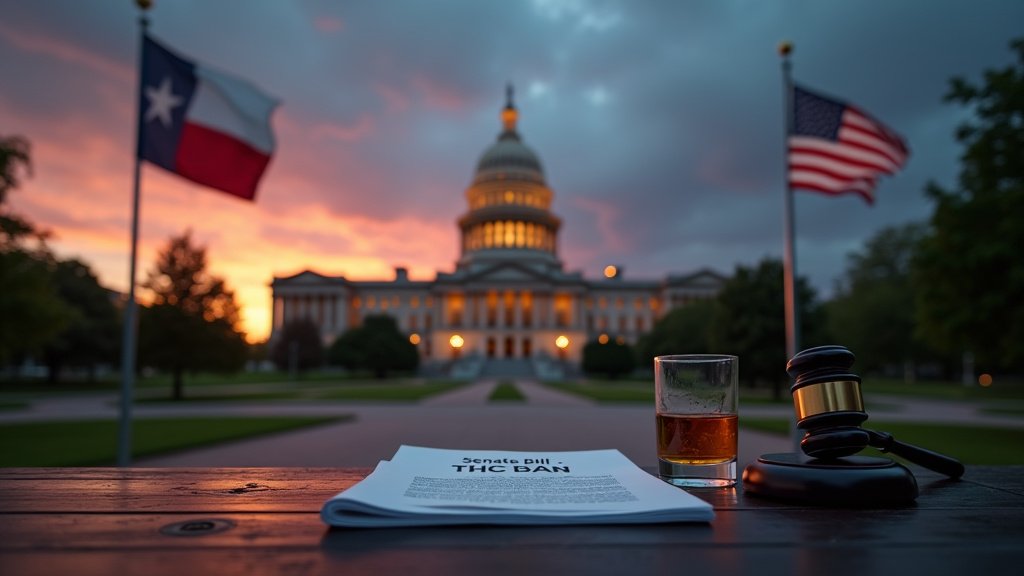Texas Senate Revives THC Ban After Abbott’s Veto
The Texas Senate is once again taking up the controversial issue of regulating tetrahydrocannabinol (THC), a move that comes just a month after Governor Greg Abbott vetoed a similar bill. This latest effort underscores the ongoing struggle to define the legal boundaries of cannabis-related products within the state and highlights the persistent tensions between different branches of government regarding this complex issue. The new bill, mirroring previous legislative attempts, aims to restrict the sale and use of THC products, a direct continuation of legislative pushes that have become a recurring theme within the Texas legislative landscape.
The Veto’s Fallout and Underlying Concerns
Governor Abbott’s previous veto of the initial bill had sparked considerable debate. The Governor’s decision was primarily driven by concerns that the proposed legislation could negatively impact the state’s agricultural sector. This suggests a significant economic dimension to the issue, with potential ramifications for farmers and businesses involved in the cultivation, processing, and distribution of hemp-derived products. The Governor’s veto signals his reluctance to adopt measures that might disrupt established industries or create unforeseen economic consequences. The current bill’s proponents will need to address these concerns if they hope to succeed.
The Regulatory Landscape of Cannabis-Related Products
The central focus of this legislative push is the regulation of intoxicating hemp products. These products, derived from the cannabis plant but containing varying levels of THC, have gained increasing popularity in recent years. The challenge for lawmakers lies in defining clear legal standards that balance public safety with the interests of businesses and consumers. The new bill’s details will be critical in determining the scope and specifics of these regulations. Discussions around the proposed ban inevitably involve the broader debate surrounding cannabis legality and the distinctions between hemp, marijuana, and their respective psychoactive components.
A Recurring Theme in Texas Politics
The push for a THC ban is not an isolated event; it represents an ongoing effort to define the parameters of cannabis-related product regulation in Texas. This persistent legislative focus highlights the contentious nature of cannabis-related issues and the varied perspectives held by lawmakers, interest groups, and the public. This legislative session’s continuation of the debate reflects deep-seated divisions concerning personal freedoms, public health, and the economic potential of the cannabis industry. These discussions are likely to continue for the foreseeable future, as the state grapples with complex questions of legality, safety, and economic opportunity.
Economic Considerations and Agricultural Impacts
The debate surrounding the THC ban has significant economic implications. The Governor’s veto pointed to potential harm to the state’s agricultural industry, raising questions about job losses, revenue impacts, and the overall viability of businesses dependent on hemp cultivation and processing. The details of the new bill, and the ways it will impact existing businesses and entrepreneurs, will be areas of intense scrutiny. Proponents will need to address the economic concerns of those affected by the ban, while opponents will likely emphasize potential negative economic repercussions to the state.
Navigating the Complexities of Regulation
The path forward for the THC ban is far from clear. The bill’s success hinges on a variety of factors, including the willingness of lawmakers to compromise, the strength of public support, and the Governor’s ultimate decision regarding its fate. The new bill will need to navigate a legislative process that is likely to be fraught with debate and negotiation. The new bill’s provisions could be amended to satisfy various stakeholders, or it could face further hurdles, including being sent back to the legislature.
Public Health and Safety Concerns
Underpinning the legislative push are public health and safety concerns. Lawmakers are likely to cite the need to protect consumers from potentially harmful products and to ensure the integrity of the state’s regulatory framework. These public health concerns are crucial to the debate and provide strong motivation for the continued legislative attempts. The discussion around the ban will almost certainly focus on potential health risks associated with unregulated THC products and ways to safeguard the public.
The Road Ahead: Key Decisions and Uncertain Outcomes
The coming weeks and months will be crucial in determining the future of THC regulation in Texas. The Senate’s actions, coupled with any responses from the House and Governor Abbott, will shape the landscape for cannabis-related products across the state. The debate is not just about THC, but about how Texas chooses to regulate a rapidly evolving market, and the legislative efforts will continue to generate significant interest and debate. The new bill’s progress, including any modifications, and the ultimate decision on whether it becomes law will be followed closely by stakeholders across the state.






